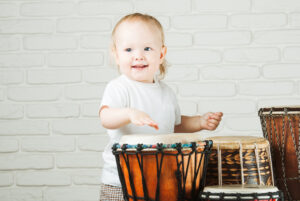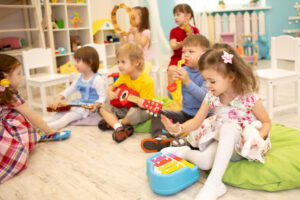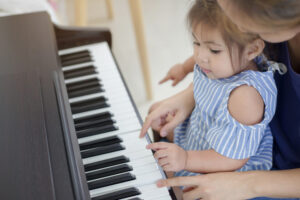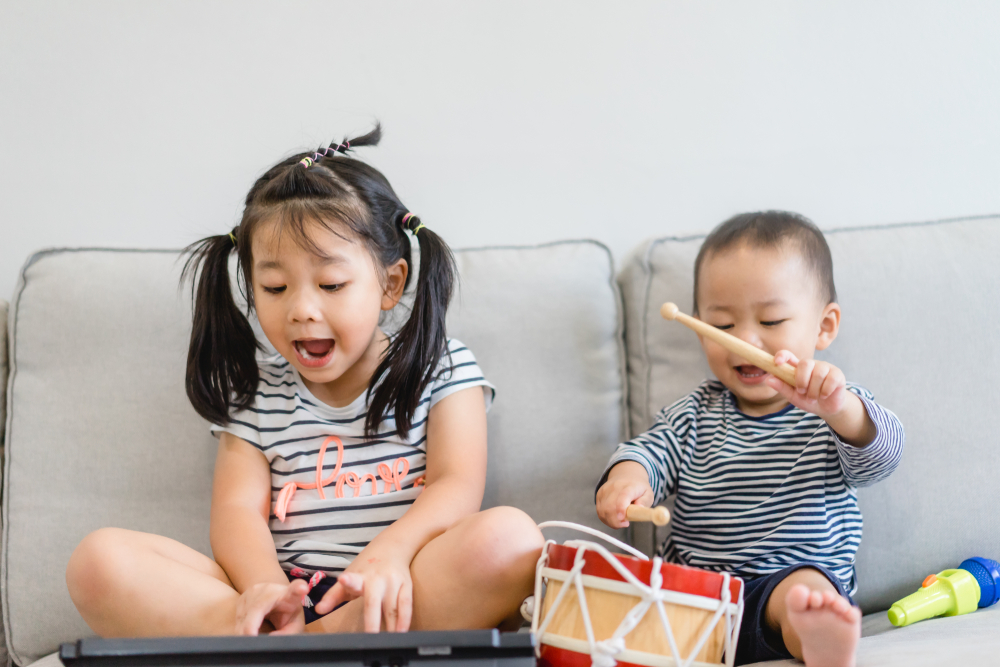While playing or listening to music, our senses are involved in a full experience that gives us a range of emotions or thoughts. Since I taught Music both in Italy and United Kingdom, I noticed a struggle to produce a Music curriculum that transcended reading notes and being able to play some simple tunes on a chosen instrument.
 While working in childcare, I observed how music in the early years can contribute to children’s physical and emotional growth and have a positive impact on their development.
While working in childcare, I observed how music in the early years can contribute to children’s physical and emotional growth and have a positive impact on their development.
Children develop their language skills while singing a nursery rhyme: they expand their vocabulary by learning new words and understand how words can be combined to create simple sentences.
While singing, children use their face muscles to articulate the words and develop their breathing pattern to gain the ability to sing a few words together using only one cycle of inspiration and expiration.
 In order to sing nursery rhymes children must memorise the words: this means developing their cognitive skills first to learn the words, then giving these words a meaning so that it is an active recalling of what they learnt rather than a mere exercise of repetition. Often children clap their hands, stomp their feet or act out the words when singing; this helps develop their motor skills, using their coordination and strengthening both their arms and hands. Also, while associating a word to the corresponding action, they give it a meaning that enhances the learning process.
In order to sing nursery rhymes children must memorise the words: this means developing their cognitive skills first to learn the words, then giving these words a meaning so that it is an active recalling of what they learnt rather than a mere exercise of repetition. Often children clap their hands, stomp their feet or act out the words when singing; this helps develop their motor skills, using their coordination and strengthening both their arms and hands. Also, while associating a word to the corresponding action, they give it a meaning that enhances the learning process.
Although children can learn a song while doing another activity and just listening to it, teaching them the words and the tune while they are sitting down together develops their ability to concentrate, maintain the same position for a certain amount of them and prepares them for their next steps in school.
During Music in the early years classes, children are offered percussion instruments, such as cymbals, maracas, wooden sticks, triangle and tambourine. While they try to hit and shake them rhythmically, children develop their motor skills, such as their hand- eye coordination when the musical instrument has two components (e. g the triangle and its wand, two wooden sticks etc.) and strengthen their wrists, hands and fingers while holding the instruments.
 Playing percussion instruments develops children’s mathematical language since they count the beats and makes them understand that they can feel the rhythm with their own body and not just with their ears. Being able to feel the rhythm with their body means that singing and playing an instrument becomes an act of confidence and freedom, where children are aware of the structure of the song and when their turn is.
Playing percussion instruments develops children’s mathematical language since they count the beats and makes them understand that they can feel the rhythm with their own body and not just with their ears. Being able to feel the rhythm with their body means that singing and playing an instrument becomes an act of confidence and freedom, where children are aware of the structure of the song and when their turn is.
When singing or playing an instrument children develop their listening skills, since they must listen to each other in order to sing and play together. This is one of the early learning goals of the Communication and Language area and a skill for life.
Being able to listen to others and waiting for their turn when singing or playing an instrument gives children an ability they will need in life when confronting and dealing with other people. As music follows a tempo, the pace or speed at which a piece of music should be played, and a rhythm, the same happens in life. Teaching children the importance of tempo and rhythm will provide them with a different perspective to approach their life where they stop and listen to others and give meaning to the process before achieving the result.
Contact our team today to find out more about how we can help your child thrive and develop, or book a time to come and see our nursery in Peckham for yourself!

